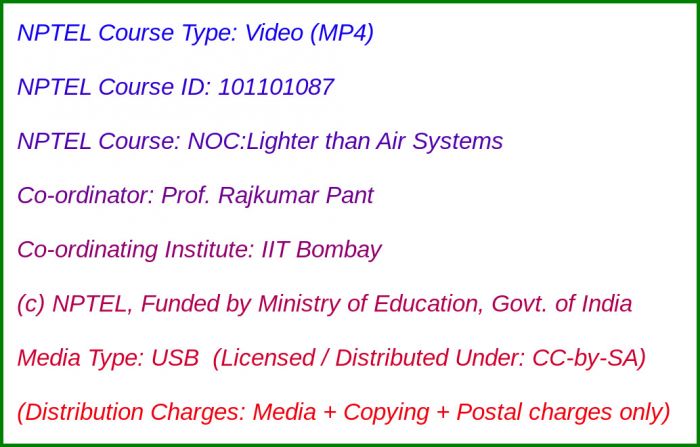
Media Storage Type : 32 GB USB Stick
NPTEL Subject Matter Expert : Prof. Rajkumar Pant
NPTEL Co-ordinating Institute : IIT Bombay
NPTEL Lecture Count : 110
NPTEL Course Size : 2.9 GB
NPTEL PDF Text Transcription : Available and Included
NPTEL Subtitle Transcription : Available and Included (SRT)
Lecture Titles:
Lecture 1 - Introduction to the Course Content
Lecture 2 - Differences between LTA and HTA systems
Lecture 3 - The three conventional LTA systems
Lecture 4 - LTA gases, Types of Airships and their components
Lecture 5 - Introduction of Skyship 600 and USP of Airships
Lecture 6 - Applications of Airships
Lecture 7 - Tethered Aerostat systems
Lecture 8 - Why use Aerostats ?
Lecture 9 - Some Queries on Aerostats
Lecture 10 - Historical developments of LTA systems - Part I
Lecture 11 - Historical developments of LTA systems - Part II
Lecture 12 - Historical developments of LTA systems - Part III
Lecture 13 - Historical developments of LTA systems - Part IV
Lecture 14 - Historical developments of LTA systems - Part V
Lecture 15 - Historical developments of LTA systems - Part VI
Lecture 16 - Overview of PADD
Lecture 17 - Remotely Controlled Airships
Lecture 18 - Autonomous Airships
Lecture 19 - Indoor Blimp Projects by students
Lecture 20 - Biomimetic Airships
Lecture 21 - Introduction to Buoyancy
Lecture 22 - Basic Concepts of Aerostatics
Lecture 23 - Ballasting, Weigh-off and Fuel Weight Recovery
Lecture 24 - In-flight Ballast Collection methods
Lecture 25 - Static Lift Prediction - Part I
Lecture 26 - Static Lift Prediction - Part II
Lecture 27 - Tutorial Problem 01 on Static Lift Estimation
Lecture 28 - Effect of Humidity and Vapour Pressure
Lecture 29 - Calculation of Ambient Air Density
Lecture 30 - Tutorial Problem 02 and 03 on Static Lift Estimation
Lecture 31 - Effect of Lifting Gas Purity, Superpressure and Superheat
Lecture 32 - Ballonet Air Weight Estimation
Lecture 33 - Net Static Lift of non-rigid airships
Lecture 34 - Net Static Lift for other LTA Systems
Lecture 35 - Tutorial Problem 04 on Net Static Lift Estimation
Lecture 36 - Parameters affecting Static Lift
Lecture 37 - Effect of change in Atmospheric Pressure
Lecture 38 - Tutorial Problem 05 on Change in Atmospheric Pressure
Lecture 39 - Effect of Superpressure
Lecture 40 - Tutorial Problem 06 on effect of Superpressure
Lecture 41 - Effect of Slow change in Atmospheric Temperature and Superheat
Lecture 42 - Effect of Rapid change in Atmospheric Temperature
Lecture 43 - Tutorial Problem 07 on Change in Atmospheric Temperature and Superheat
Lecture 44 - Revision and Tutorial Problem 08 and 09 on Affecting Parameters of Static Lift
Lecture 45 - Effect of change in Relative Humidity
Lecture 46 - Effect of change in Lifting Gas Purity
Lecture 47 - Effect of change in Lifting Gas Volume
Lecture 48 - Determination of Inflation Fraction
Lecture 49 - Flight To Lower Ground Elevation
Lecture 50 - Tutorial Problem 10 on Helium Addition
Lecture 51 - Outdoor Hot Air Balloon
Lecture 52 - Pressure Height
Lecture 53 - Tutorial Problem 11 on Pressure Height Calculation
Lecture 54 - Sea Level Inflation Fraction
Lecture 55 - Flight above Pressure Height
Lecture 56 - Effect of Change in Operating Altitude
Lecture 57 - Tutorial Problem 12 on Lifting Gas Loss
Lecture 58 - Descent Following Exceedance
Lecture 59 - Pressure Height for other LTA Vehicles
Lecture 60 - Discussion of Practice Questions
Lecture 61 - Envelope Materials - Part I
Lecture 62 - Envelope Materials - Part II
Lecture 63 - Envelope Materials - Part III
Lecture 64 - Fabric Testing Machines - Part I
Lecture 65 - Fabric Testing Machines - Part II
Lecture 66 - Need for Ground Handling
Lecture 67 - Aerium Hanger for CL 160 Airship
Lecture 68 - Ground Handling of Airships
Lecture 69 - Types of Mooring Masts and Design Requirements
Lecture 70 - Nose Battens for Envelopes
Lecture 71 - Need for Airship Design Methodology
Lecture 72 - Overview of Airship Design Methodology (ADM)
Lecture 73 - Details of Airship Design Methodology (ADM)
Lecture 74 - Inputs to Airship Design Methodology - Part 1
Lecture 75 - Inputs to Airship Design Methodology - Part 2
Lecture 76 - Design Constants in Airship Design Methodology
Lecture 77 - Outputs from Airship Design Methodology
Lecture 78 - Statistical Data Used in Airship Design Methodology
Lecture 79 - Validation of Airship Design Methodology
Lecture 80 - Envelope Shapes for LTA Systems
Lecture 81 - Example of Application of Airship Design Methodology
Lecture 82 - Conclusions and Limitations of Airship Design Methodology
Lecture 83 - History of Propulsion Systems on Airships
Lecture 84 - Steam and IC engines for Airships
Lecture 85 - Electric motors for Airships
Lecture 86 - Turboprops for Airships
Lecture 87 - Solar Propulsion and Thrust Vectoring on Airships
Lecture 88 - Transportation Problems Faced by Remote Regions
Lecture 89 - Airships vs Helicopters - Part I
Lecture 90 - Airships vs Helicopters - Part II
Lecture 91 - Char Dham Yatra - Part I
Lecture 92 - Char Dham Yatra - Part II
Lecture 93 - Introduction to Aerostat Design Methodology
Lecture 94 - Inputs for Aerostat Design Methodology
Lecture 95 - Design Constants in Aerostat Design Methodology
Lecture 96 - Overview of Aerostat Design Methodology
Lecture 97 - Equilibrium Analysis of Aerostats - Part I
Lecture 98 - Equilibrium Analysis of Aerostats - Part II
Lecture 99 - Methodology for Tether Profile Estimation
Lecture 100 - Introduction to High Altitude Airships
Lecture 101 - Technological challenges in HALE Platforms development - Part I
Lecture 102 - Technological challenges in HALE Platforms development - Part II
Lecture 103 - Initial sizing of Stratospheric Airships
Lecture 104 - Introduction to Hybrid Airships
Lecture 105 - Lockheed Martin's P-791 Hybrid Airship
Lecture 106 - Aeroscraft ML 866 Hybrid Airship
Lecture 107 - SkyCat Hybrid Airship
Lecture 108 - Rotary and Winged Hybrid Airships
Lecture 109 - Hybrid Ultra Heavy Lift Cargo Vehicle Transport
Lecture 110 - Features of Hybrid Airships

